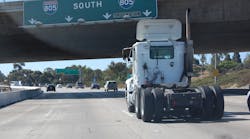A lawsuit filed by the Owner-Operator Independent Drivers Association (OOIDA) against the California Air Resources Board (CARB) last week seeks an injunction against the agencies truck and bus emission regulations because those rules interfere with interstate commerce and discriminate against out-of-state truckers.
“It’s not about emission compliance of older trucks or newer trucks; it’s about violating the Commerce Clause” of the U.S. Constitution, Norita Taylor, OOIDA’s spokesperson, told Fleet Owner.
“And it’s discriminatory because someone from New York may only go into California only a few times per year whereas someone based in California drives a lot more of their miles in that state,” she added. “Again it’s about the fact that the federal government is in charge of regulating commerce and states are not supposed to.”
According to the Legal Information Institute (LLI) at Cornell University Law School, the “Commerce Clause” refers to Article 1, Section 8, Clause 3 of the U.S. Constitution, which gives Congress the power “to regulate commerce with foreign nations, and among the several states, and with the Indian tribes.”
The group noted that the Commerce Clause has historically been viewed as both a grant of congressional authority and as a restriction on state powers to regulate. The “dormant” Commerce Clause refers to the prohibition, implied in the Commerce Clause, against states passing legislation that discriminates against or excessively burdens interstate commerce.
Yet the LLI cautioned that the meaning of the word "commerce" is a source of much controversy as the U.S. Constitution does not explicitly define the word. Some argue that it refers simply to trade or exchange, while others claim that the founders intended to describe more broadly commercial and social intercourse between citizens of different states. Thus, the interpretation of "commerce" affects the appropriate dividing line between federal and state power.
OOIDA’s lawsuit, filed Dec. 6 in U.S. District Court, Eastern District of California, seeks to permanently enjoin CARB from enforcing its truck and bus emission regulatory program, which mandates that 1996 to 2006 model year trucks weighing more than 14,000 pounds need to be either replaced or retrofitted with diesel particulate filters (DPFs). It also prohibits older trucks that have not been replaced or retrofitted from operating on public roads in California.
OOIDA contends that CARB’s truck and bus rules, which went into effect Jan. 1, 2012, have caused and will continue to cause” irreparable harm” to truckers who have been shut out of the California market because of the costs of compliance, which OOIDA’s Taylor says can range between $18,000 and $20,000 to retrofit an older Class 8 truck.
“It puts out-of-state truckers at a disadvantage because the cost to upgrade is disproportionate to the number of miles traveled in the state of California,” noted Jim Johnston, president and CEO of OOIDA, in a statement.
He added that trucking equipment purchased by OOIDA members when such equipment met all California regulatory requirements is now obsolete for use in California because of the new restrictions imposed by CARB’s regulations.
On top of that, OOIDA argued that failure to buy and retrofit trucking equipment as required by the CARB regulation will effectively exclude out-of-state truckers from the California trucking market unless they are willing to face fines and penalties for noncompliance.
Efforts to overturn emission rules mandating retrofits for older equipment have seen mixed success in recent years. Trucking groups won a court battle against similar rules in New York state back in 2011, but a petition on behalf of port truckers in California before a CARB administrative panel failed that same year.



